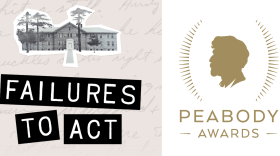The first season of Document, The List, was released on October 26th, and some surprising news followed soon after. Listeners heard that a lawsuit had been filed in an attempt to make New Hampshire’s secret list of cops with credibility issues available to the public. On Friday, Oct. 30, the state Supreme Court issued a ruling in the case. Usually, the court takes months to issue a decision. This time it only took them six weeks.
Document Senior Producer Lauren Chooljian sat down with Reporter Jason Moon to get an update on what the decision says and what it means.
Lauren Chooljian: Listeners may remember this lawsuit - it was brought by the ACLU of New Hampshire and a bunch of local news outlets, including one led by Nancy West, who we got to know in Episode 1. They were arguing that the public should be able to see the Laurie list, this secret list of 270 or so cops with credibility issues. And on Friday we found out that the supreme court ruled in Nancy’s favor, right? So can we now see the Laurie list? Do we finally know who’s on it?
Jason Moon: No. We still don’t know who’s on the list. But the ruling does put us one step closer to knowing who is on it.
What do you mean?
Well the court ruled that, at least in theory, the Laurie list is a public document. This is a big deal. The state tried to argue that the list was exempt from New Hampshire’s public records law, the Right-to-Know Law, which gives the public access to government documents and records so they can see what their government is up to. The court didn’t go for that; they said the list is subject to the law.
So, if it’s subject to Right-to-Know, why can we still not see it?
Well, even within the Right-to-Know Law there are exemptions for what kind of government records can be made public - so you can get emails sent by state employees, but you can’t make a public records request for someone’s medical records, for instance. And one of the exemptions has to do with whether the release of government records would amount to “an invasion of privacy.”
Sure, but who decides if something is an invasion of privacy?
It’s up to the courts. And in this case, the state supreme court is sending the case back down a level to let a lower court judge decide if the release of the Laurie list would be an invasion of privacy for the officers whose names are on there. And so this judge will do what they call a "balancing test." They will weigh three competing interests: The public’s interest in seeing the list; the government’s interest in keeping it confidential; and the individual officers’ interest in keeping it confidential - basically, would releasing their names be too intense an invasion of their privacy? It’s a lot of discretion.
Interesting. Do we have any clues as to where the judge might come down after that balancing test? How long do you think we have to wait for more news?
Obviously we can’t say with any certainty how it will turn out - and clearly we’re bad at anticipating when these decisions will happen - but I do think it’s safe to say the legal landscape around access to police personnel files is beginning to change in New Hampshire. There have been some other state supreme court rulings in just the past few months that have weakened the confidentiality around police personnel files, by establishing that these kinds of records are not automatically exempt from Right-to-Know laws. Just last week, in fact, the Union Leader newspaper was able to get some documents from an Internal Affairs investigation into an officer who was found to have sent racist text messages. Just the fact that we’re able to see some of those documents was a real milestone in itself.
We talked a lot in the podcast about how the confidentiality of police misconduct files in New Hampshire has been a given for so many years - that’s changing, even in just the past few weeks. And if the lower court judge rules that the public’s interest in the Laurie list outweighs the individual officers’ privacy interest, then that will definitely mark a new era in police accountability in the state.
To read the full text of the NH Supreme Court's decision, click here.
If you want NHPR to make more work like this, consider making a donation to the station. The amount is up to you, but every contribution really makes a difference. Make a gift here.









